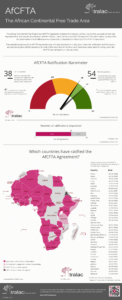
African Continental Free Trade Agreement (AfCFTA) is a flagship programme of the African Union. It responds to the Africa Union’s aspiration for a prosperous Africa based on inclusive growth and sustainable development.
The AfCFTA is expected to lead to the creation of a single African market for goods and services, facilitate free movement of people, mobilise regional investments and ultimately see to the creation of a Continental Customs Union.
“…an Africa whose development is people-driven, relying on the potential of African people, especially its women and youth, and an Africa that is strong, united, resilient and an influential global player and partner.”
~ AU AGENDA 2063
Intra-Africa trade is a mere 15% – a very low number compared with other continents. It is currently more expensive for countries to export inside Africa than outside. By getting rid of tariffs and barriers, the AfCFTA hopes to increase trade between countries.

Implementing the AfCFTA will be a mammoth task considering the predicted scale of trade liberalisation. The trade union movement has barely participated in the agreement’s negotiations process, yet the agreement has potential risks for workers and communities. Trade unions are well-placed to advocate for workers and the broader community. To this end, the voice of labour must be welcomed in any negotiations going forward.
This article focuses on the AfCFTA’s objectives and aims to develop the understanding of the agreement by trade unions so that they can enter the discourse as informed role-players.
The AfCFTA’s treaty document sets out eight general objectives. The objectives address a range of issues, from integration, free movement of people and goods, to policy and industrial development, and competitiveness. Except for the reference to ‘inclusive socio-economic development’, the objectives lack direct reference to employment creation, social protection, rights at work, and social dialogue, as part of the Decent Work Agenda.
Included in the specific objectives are the seven protocols of the AfCFTA, namely trade in goods, trade in services, dispute settlement, competition, intellectual property, investment and e-commerce.
With regards to how the AfCFTA will integrate with existing development initiatives, the Trade Law Center (TRALAC) puts it thus:
Agenda 2063 is Africa’s framework for structural transformation. It builds on and aims to facilitate the implementation of existing continental initiatives (AIDA, PIDA, BIAT and CAADP). The establishment of the AfCFTA, a single African air transport market (SAATM), and the free movement of people are Agenda 2063 flagship projects. The AU has adopted legal instruments for the effective implementation of these flagship projects. Importantly, the UN Agenda 2030’s 17 SDGs are incorporated in the 20 goals of Agenda 2063. By implementing Agenda 2063, Africa will also meet its global commitments under the SDGs.